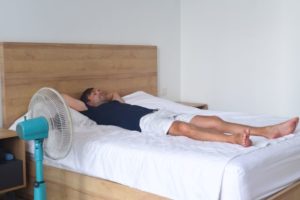
Have you ever found it difficult to sleep during a hot summer night? Most people have. High temperatures do more than just cause discomfort, however. They can have a significant impact on the quality of your nighttime rest. This issue is especially problematic for individuals with sleep apnea. How exactly does temperature affect sleep apnea, and what can you do to create an environment that promotes high-quality sleep? This blog post shares some important information.
High Temperatures and Sleep Apnea
When you fall asleep, your body temperature drops slightly. If the environment outside of your body is too hot, your system has to work that much harder to get your body to a temperature where it can achieve optimal rest. Ideally, you should sleep in a room that is somewhere between 60 and 67 degrees Fahrenheit.
Individuals with sleep apnea should be especially concerned about their sleeping environment. Several studies have found that people with this condition exhibit less rapid eye movement and slow wave sleep, as well as increased wakefulness, when they are resting in an environment that is too warm.
Reduced sleep quality can occur regardless of whether a person uses their sleep apnea treatment, whether that is a CPAP machine or an oral appliance from a dentist.
What Can You Do?
Here are some tips to help you create a bedroom environment that is conducive to high-quality sleep:
- Adjust your thermostat at night to somewhere between 60 and 67 degrees.
- Use cooling or moisture-wicking sheets. If you normally sleep hot, silk or cotton bedding may be especially helpful.
- Use a humidifier (or dehumidifier, depending on the circumstances) to promote easy breathing at night.
- If you do not have air conditioning during summertime, open a window or use a fan to keep yourself as cool as possible.
- Remember that memory foam mattresses can trap heat. If your mattress runs hot, you may need to switch to cooling memory foam or a traditional spring mattress.
- Deep clean your room. This can reduce allergens and irritants that might exacerbate nighttime breathing problems.
- Monitor the quality of your sleep and talk to your treatment provider if you are struggling to feel well-rested despite your efforts to maintain a healthy bedroom environment.
The temperature of your surroundings can affect the quality of your sleep! Make necessary adjustments so you can get the rejuvenating shuteye you deserve.
Meet the Practice
Dr. Ray Voller has more than four decades of experience in the dental world. He has completed advanced training in order to offer treatment for sleep apnea. If you are constantly exhausted or have other symptoms of a sleep disorder, our team would be happy to guide you on your next steps. Contact our Kittanning office at 724-542-4948.
